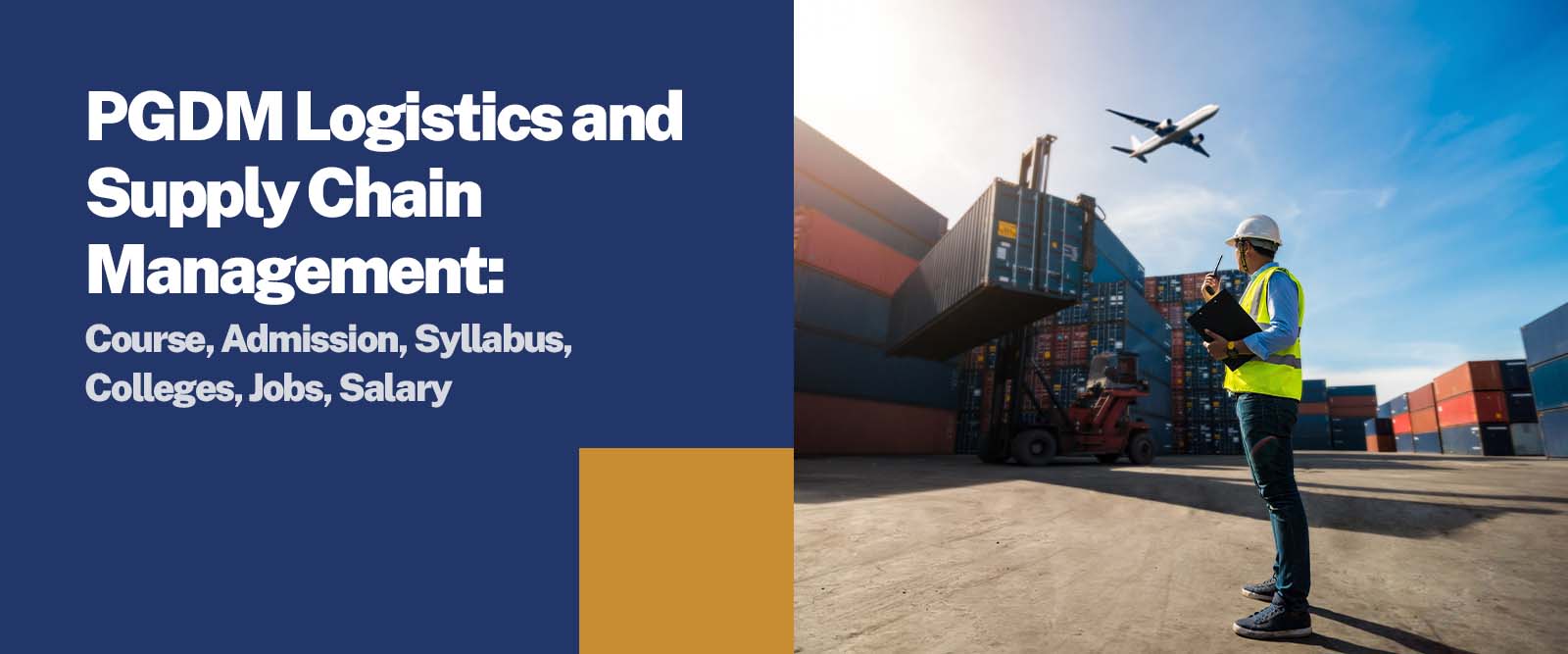5800 students unlocked their dream jobs with UG/PG programs in top colleges. Apply Now!
PGDM is a postgraduate course designed to equip students with the knowledge and skills necessary to pursue a career in various management areas, including finance, marketing, human resources, operations, and entrepreneurship.
The full form of the PGDM Course is Post Graduate Diploma in Management. The program is similar to an MBA (Master of Business Administration) but is offered by autonomous institutions rather than universities. This course provides a comprehensive understanding of business concepts, managerial skills, and a practical approach to problem-solving.
The purpose of this blog is to provide you with a detailed overview of PGDM in Logistics and Supply Chain Management and reasons why you should pursue it.
What is PGDM in Logistics and Supply Chain Management?
PGDM in Logistics and Supply Chain Management is a specialised program that focuses on the principles and practices involved in managing the flow of goods, services, and information across the supply chain. It is a postgraduate diploma program that aims to develop professionals with the knowledge and skills necessary to effectively manage logistics and supply chain operations in various industries.
The program covers a wide range of topics related to logistics and supply chain management, including procurement, inventory management, transportation, warehousing, distribution, supply chain analytics, and global logistics.
The program prepares graduates for careers in logistics and supply chain management roles across industries such as manufacturing, retail, e-commerce, healthcare, transportation, and logistics service providers.
Course Highlights
|
Course name |
Postgraduate Diploma in Management |
|
Duration |
1-2 years |
|
Entry Mode |
Entrance based |
|
Average course Fee |
Rs. 1,00,000 to Rs. 20,00,000 |
|
Average salary package |
5-10 LPA |
PGDM Vs MBA
PGDM (Post Graduate Diploma in Management) and MBA (Master of Business Administration) are both postgraduate programs in the field of management, but there are some differences between them. Here's a comparison of PGDM and MBA
|
PGDM |
MBA |
|
|
Program Structure and Affiliation |
PGDM programs are offered by autonomous institutes and business schools. These institutes have the freedom to design their curriculum, update it regularly, and adapt to changing industry needs. |
MBA programs are typically offered by universities. The curriculum is often standardised across different universities and may not be updated as frequently as PGDM programs. |
|
Duration and Flexibility |
PGDM programs generally have a duration of 1-2 years, depending on the institute. They may offer flexibility in terms of course structure, allowing students to choose electives and specialise in specific areas. |
MBA programs usually have a fixed duration of 2 years. The curriculum is often more structured and offers a broader range of core courses, with limited flexibility in terms of specialisation. |
|
Recognition and Accreditation |
PGDM programs are recognised by the All India Council for Technical Education (AICTE) in India and other regulatory bodies. However, they do not grant a degree but award a diploma from the institute itself. |
MBA programs grant a master's degree in business administration from the university. |
|
Curriculum and Industry Orientation |
PGDM programs are known for their industry-oriented curriculum. They focus on practical skills, case studies, industry internships, and interaction with industry experts, preparing students for real-world challenges. |
MBA programs generally provide a comprehensive management education with a mix of core courses in various business disciplines. The curriculum may have a more theoretical and academic approach. |
|
Admission Criteria |
Admission criteria for PGDM programs vary across institutes but commonly include entrance exams, group discussions, and personal interviews. Institutes may have their own selection processes and criteria. |
MBA programs often require candidates to take entrance exams like the GMAT or GRE. Admission criteria may also include academic performance, work experience, and personal interviews. |
Curriculum and Course Structure of PGDM
The curriculum and course structure of a PGDM program can vary across different institutes. However, here is the general overview of the typical components and subjects that are commonly included in a PGDM curriculum:
A. Core courses in the PGDM program
PGDM programs typically begin with a set of core courses that provide a foundation in various areas of management. These core courses cover fundamental concepts and principles in subjects such as:
- Organisational Behavior
- Managerial Economics
- Financial Accounting and Analysis
- Marketing Management
- Operations Management
- Human Resource Management
- Business Communication
- Business Ethics and Corporate Governance
- Strategic Management
B. Elective courses and specialisation options
After completing the core courses, students often have the opportunity to choose elective courses based on their interests and career goals. Elective courses allow students to specialise in specific areas of management. Some common elective subjects in a PGDM program may include
- Finance
- Marketing
- Human Resources
- Operations and Supply Chain Management
- International Business
- Entrepreneurship
- Information Technology Management
- Business Analytics
- Strategic Marketing
- Investment Management
- Retail Management
- Project Management
C. Case studies, projects, and internships
PGDM programs typically incorporate practical learning through projects, case studies, and simulations. Students work on real-world business problems, analyse case studies, and develop practical solutions. These activities help students apply theoretical concepts to real business scenarios and enhance their problem-solving and decision-making skills.
D. Industry Internships
Many PGDM programs require students to undertake internships or industry projects. These internships provide students with hands-on experience in a professional setting, allowing them to apply their classroom learning in a practical business environment. Internships also help students build industry connections and gain insights into the actual workings of organisations.
E. Capstone Project or Dissertation
Towards the end of the program, students may be required to undertake a capstone project or dissertation. This project involves conducting independent research on a specific management topic under the guidance of faculty members. It allows students to demonstrate their research skills, critical thinking, and analytical abilities.
The Skill Set You Will Develop after Completing PGDM
- Analytical and problem-solving skills
- Strategic thinking and decision-making abilities
- Effective communication and negotiation skills
- Leadership and teamwork capabilities
- Technological proficiency and data analytics skills
- Knowledge of industry trends and emerging practices
Career Opportunities and Placement Assistance
Graduates with a PGDM in Logistics and Supply Chain Management can explore a wide range of job roles across various sectors. Here are some potential job roles for PGDM graduates in Logistics and Supply Chain Management:
- Supply Chain Manager: Responsible for overseeing and managing the entire supply chain process, including procurement, production, inventory management, logistics, and distribution. They ensure the efficient flow of goods and services and collaborate with suppliers, manufacturers, and distributors to optimise operations.
- Logistics Coordinator: Coordinate and manage the transportation, warehousing, and distribution activities within a supply chain. They plan and schedule shipments, manage inventory levels, and ensure timely delivery of products to customers. Logistics coordinators also handle documentation, customs clearance, and compliance with regulations.
- Operations Manager: Oversee the day-to-day operations of a company's supply chain. They monitor production processes, manage inventory levels, optimise resource utilisation, and ensure efficient coordination between different departments involved in the supply chain.
- Procurement Executive: Responsible for sourcing and procuring raw materials, components, and services required for production. They identify potential suppliers, negotiate contracts, evaluate supplier performance, and ensure timely delivery of goods while maintaining cost efficiency and quality standards.
- Inventory Analyst: Analyse inventory levels, demand patterns, and sales forecasts to optimise inventory management. They develop inventory strategies, implement inventory control systems, and monitor stock levels to minimise carrying costs while meeting customer demand.
- Warehouse Manager: Oversee warehouse operations, including receiving, storing, and dispatching goods. They optimise warehouse layout, manage inventory accuracy, implement safety protocols, and coordinate with logistics partners for efficient movement of goods.
- Demand Planner: Forecast future demand for products based on historical data, market trends, and customer insights. They collaborate with sales, marketing, and production teams to develop accurate demand plans, optimise inventory levels, and ensure customer satisfaction.
- Supplier Relationship Manager: Manage relationships with suppliers and vendors to ensure a reliable and efficient supply chain. They negotiate contracts, monitor supplier performance, resolve disputes, and identify opportunities for collaboration and cost savings.
- Logistics Analyst: Analyse logistics data, including transportation costs, route optimisation, and warehouse efficiency. They identify areas for improvement, develop logistics strategies, and implement process enhancements to optimise supply chain operations.
- Consulting roles: Graduates can also pursue careers in logistics and supply chain management consulting firms. In these roles, they provide advisory services to companies, help optimise supply chain processes, implement best practices, and identify opportunities for improvement.
Admission Process and Eligibility Criteria
The entry requirements for a PGDM program in Logistics and Supply Chain Management can vary between institutes. However, here are some common eligibility criteria:
- Educational Qualifications: Candidates should typically hold a bachelor's degree in any discipline from a recognised university or institution. The degree may need to be obtained with a minimum aggregate score, which can vary between institutes.
- Work Experience: Some institutes may prefer or require candidates to have relevant work experience in the field of logistics, supply chain management, or related industries. The required work experience, if any, can vary from institute to institute.
- Entrance Exams: Many institutes require candidates to have valid scores in management entrance exams such as CAT (Common Admission Test), XAT (Xavier Aptitude Test), GMAT (Graduate Management Admission Test), MAT (Management Aptitude Test), or CMAT (Common Management Admission Test). The specific exams accepted may differ between institutes.
Why choose Sunstone for your PGDM?
- Colleges powered by Sunstone offer multiple benefits to students for succeeding in job interviews.
- Students get access to more than 70 sessions conducted by industry experts and recruiters.
- They get opportunities to work on capstone projects every semester.
- Students can create a professional portfolio that will attract recruiters.
- The faculty members are highly experienced and have worked at prestigious institutions such as IIMs and IITs.
- These benefits provided by colleges powered by Sunstone can significantly improve a student's career prospects.
HELP
Take the first step towards your dream job.
ABOUT THE AUTHOR

